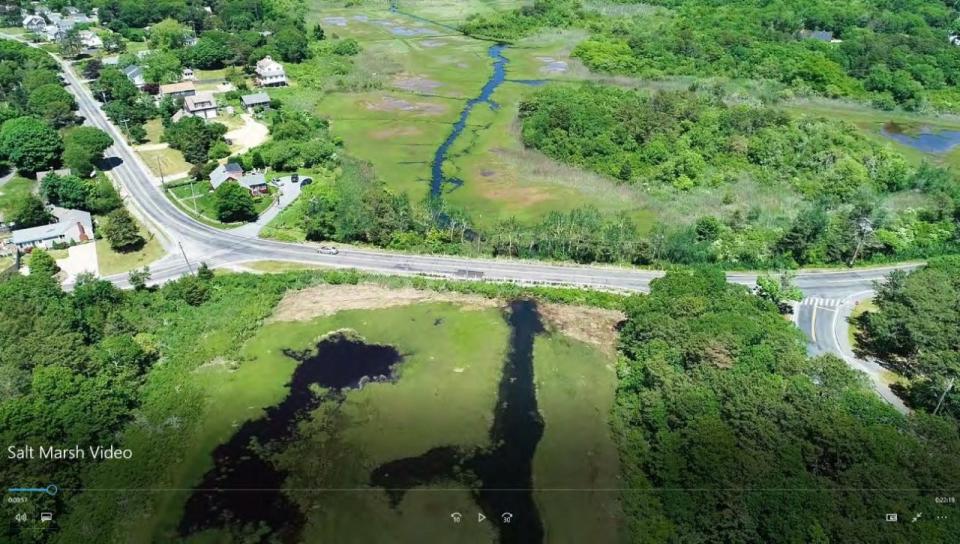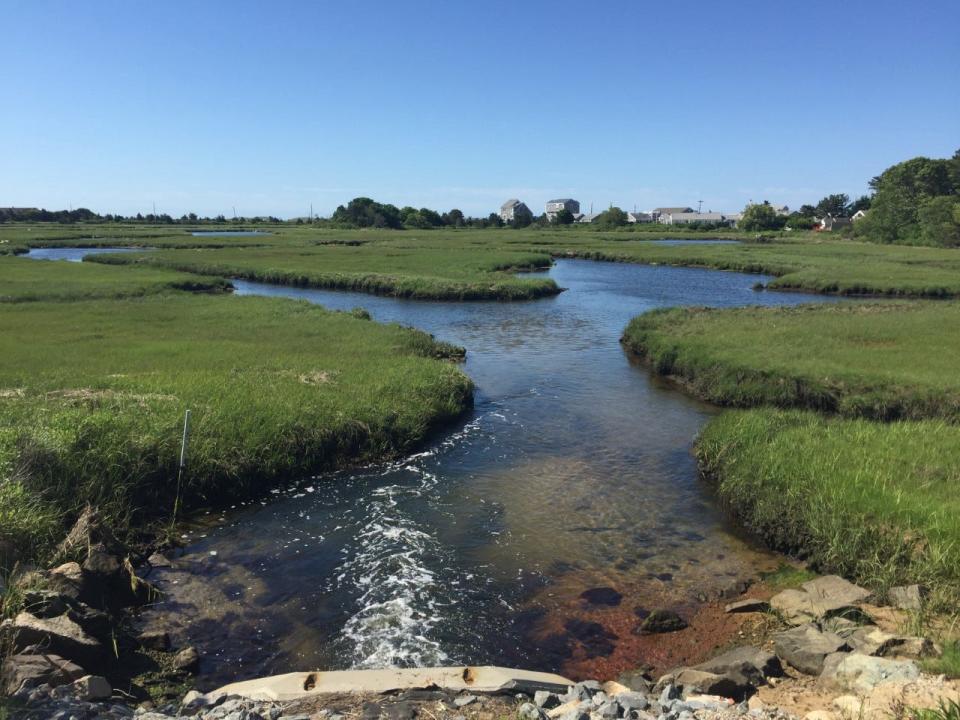Climate change prep: Restoration project eyed for Weir Creek salt marsh in Dennis
DENNIS — A West Dennis saltmarsh that has been nearly cut off from the ebb and flow of the tides, its marine heartbeat fading as it has steadily choked on invasive reeds and freshwater plants, may have a chance at rebirth thanks to a grant from the Southeast New England Program.
The regional initiative, funded by Congress and managed by the U.S. Environmental Protection Agency, recently awarded $138,616 to the Association to Preserve Cape Cod to study the feasibility of tidal restoration of the Weir Creek wetlands.
April Wobst, a restoration ecologist with the association, said the nonprofit will work with the town on the effort.
"We've been looking, along with the towns, at restoration needs across the Cape for over a decade," she said. The Weir Creek area, she said, has been identified on several lists as one needing attention.
The Weir Creek wetlands ultimately feed into the Bass River, and from there into Nantucket Sound. The study will investigate restoring more than 70 acres of wetlands along Weir Creek, which also has connections to Kelleys Pond and Uncle Stephans Pond.
Back to nature:Herring River restoration project gets a hefty $22.67M boost from state
The wetland system is severely tidally restricted by two undersized culverts, leading to impaired salt marsh habitat and negative impacts on the nearby community. The site is a priority for the town and the USDA Natural Resource Conservation Service under the Cape Cod Water Resources Restoration Project and has been identified for future federal funding for construction.
"Essentially, the feasibility study will be the start of a project," said Wobst, who is collaborating with Dennis town engineer Tom Andrade.
Wobst manages the restoration coordination center at the Association to Protect Cape Cod, which partners with towns to help plan and restore sites from salt marshes to cranberry bogs. Since there are no formal restoration studies completed for the Weir Creek salt marsh, the first step will be to work with the town to hire a consultant to undertake the study.

Describing the Weir Creek system as a "complex site," Wobst explained it consists of a main channel "that goes through an undersized culvert under Lower County Road," and a second culvert just to the east of Lighthouse Road that flows south to Uncle Stephans Pond through "a very small pipe that we measured at just 14 inches."
The two culverts together are restricting the tidal flow that is essential to the health of a salt marsh. The initial study will include modeling to determine to what extent tidal flow can be increased to help restore the salt marsh.
"If you get more tidal flow in there, you get more flushing," thereby improving water quality in Weir Creek and the Bass River, Wobst said.
Environmental restoration:$42.5 million coming to Cape for water resource projects
Restoring the marsh would also improve resilience to climate change, an important aspect in the face of more frequent storms and rising sea levels.
Under present conditions, part of the area is challenged with storm-related flooding. Also, because the marsh is not getting enough tidal water, the salinity is very low. Blocking the wetland from the natural rhythms of the ocean has created perfect conditions for the growth of phragmites, a common wetland reed that the Massachusetts Department of Conservation and Recreation characterizes as an "aggressive wetland invader."

This is "a highly competitive plant that is capable of rapid growth and spread," the agency's phragmites fact sheet notes. The plant "displaces native species, reduces biodiversity, offers little value for wildlife and chokes waterways," spreading rapidly and filling wetlands to the extent that "water flow is reduced and the flood retention of the wetland is decreased," according to the document.
Wobst said most plants that do find a foothold are more suited to freshwater. As a result, the salt marsh is degraded and aquatic species including shellfish are harmed. There are also impacts on other salt marsh wildlife, such as the saltmarsh sparrow, presently listed by the state as a species of special concern.
Curious Cape Cod:Hiking reward: Mysterious trail leads to awesome ocean vista in Truro
As the project proceeds, public meetings will be scheduled to inform residents about the issues the Weir Creek salt marsh faces and discuss ways to address them.
"We'll have concept designs, hopefully, by the end of next year," Wobst said.
The Southeast New England Program grant that will pay for the Weir Creek feasibility study is part of $1 million in awards for six high-priority projects in Massachusetts.
“Southeast coastal New England is very special, shaped by its history of innovation and its iconic bays,estuaries, and landscapes. But we know it is also under increasing threats from climate change, nutrientpollution and other stressors,” said David Cash, EPA New England regional administrator.
Through programs like the Southeast New England Program, he said, "we are advancing effective practices and increasing local capacity through funding, collaboration, and innovative approaches — essential for meeting our communities’ needs and contributing to the sustained ecosystem health and economic vitality of our coastal communities."
Massachusetts Division of Ecological Restoration Director Beth Lambert agrees, saying the program is critical to addressing the challenges of climate change."Although communities throughout southeastern Massachusetts are eager to improve stormwatermanagement, restore habitat, and ramp up adaptation to climate change, they lack the time, money,expertise, and staff to move these projects forward," she said. The program, she said, works to fill these gaps "by providing much needed technical assistance and funding, and bringing communities and expertstogether."
Contact Heather McCarron at hmccarron@capecodonline.com.
Stay connected with Cape Cod news, sports, restaurants and breaking news. Download our free app.
This article originally appeared on Cape Cod Times: Cape Cod: Weir Creek salt marsh restoration study receives funding

